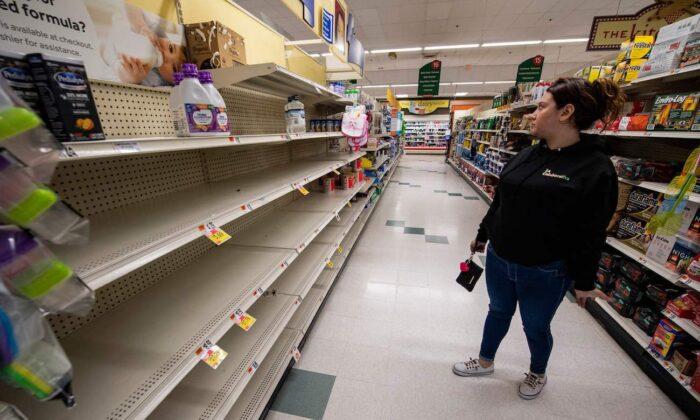The U.S. Food and Drug Administration (FDA) announced on Tuesday it will allow about 2 million cans of baby formula from the United Kingdom into the country, and allow Abbott Laboratories to release about 300,000 cans of specialty formula, to help ease the ongoing nationwide shortage.
“Importantly, we anticipate additional infant formula products may be safely and quickly imported into the U.S. in the near-term based on ongoing discussions with manufacturers and suppliers worldwide.”
Kendal Nutricare currently has over 40,000 cans in stock for immediate dispatch, the agency said, adding that the U.S. Department of Health and Human Services is discussing options to get those cans into the country as soon as possible.
The FDA also announced it is letting Abbott release some 300,000 cans of its EleCare amino acid-based formula for babies and infants who urgently need it to survive, on a case-by-case basis.
“These products will undergo enhanced microbiological testing before release. Although some EleCare product was included in Abbott Nutrition’s infant formula recall, these EleCare products that will be released were in different lots, have never been released and have been maintained in storage under control by Abbott Nutrition,” the FDA noted.
“Given the critical need of this product for some individuals, the FDA encourages parents and caregivers to consult with their health care providers to weigh the potential risk of bacterial infection with this product,” it added. “Parents and caregivers seeking access to these products should contact Abbott directly to request that a product be made available to them by calling 1-800-881-0876.”
The ongoing baby formula shortage in the United States was recently exacerbated after Abbott Laboratories, the biggest U.S. supplier of powder baby formula, in February recalled some products, including those under the brand Similac, and temporarily shuttered its manufacturing facility in Sturgis, Michigan, which was producing up to one-quarter of the country’s baby formula.
Prior to the Abbott recall, the baby formula shortage among multiple manufacturers was brought on by supply chain pressures linked to COVID-19 pandemic lockdowns.
President Joe Biden has also invoked the Cold War-era Defense Production Act to help manufacturers obtain ingredients to produce more formula.




